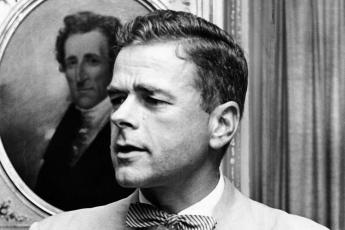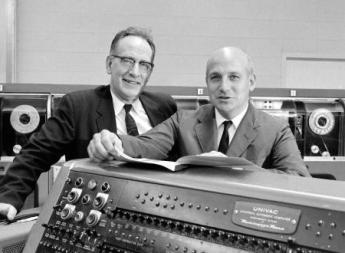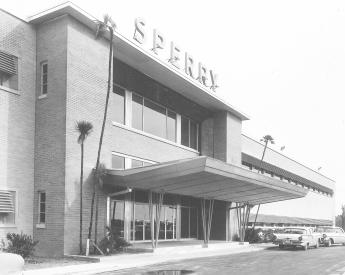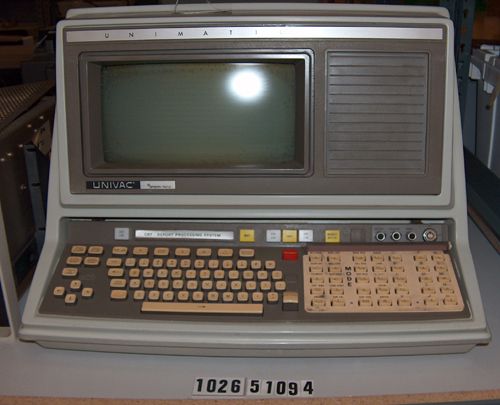Related Topics
Computers, Digital Cameras, and Cellphones
Much of the early development of the electronic computer took place in Philadelphia. We lost the lead, but it might return.
In Memoriam
Charles Peterson
Lewis B, Flinn, M.D.Wilton A. Doane,MD
Henry Cadbury
Martin Orne, MD, PhDGeorge W. Gowen, MD
Kenneth Gordon, MD
Mary Stuart Fisher, MDOrville P. Horwitz,MD
Lewis Harlow van Dusen, Jr.
Hobart Reiman, MD.
Lindley B. Reagan, M.D.
Allan v. Heely
Frederick Mason Jones, Jr.
Russell Roth,MD
George Willoughby
Earle B. Twitchell
Jonathan Evans Rhoads, Sr.
Garfield G. Duncan,MD
Hastings Griffin
Joseph P. Nicholson
Howard LewisAl DriscollHenry Bockus, MD
Mary Dunn
William H. Taylor
Abraham Rosenthal
Decline and Fall of Philadelphia
In 1900, Philadelphia was described as the largest commercial (ie non-capital) city in the world. By 1929 it was flat on its back, and never recovered its former position. Why did this happen?
Right Angle Club 2017
Dick Palmer and Bill Dorsey died this year. We will miss them.
The Lawsuit That Ate Philadelphia

|
| F. Hastings Griffin |
Hastings Griffin ("Haste") died last week in his nineties. The Orpheus Club put on a concert at his memorial service, and probably the Squash world put on something because he was the reigning world champion for his age group. And his wife was there in all her glory, having married and outlived three men, all of whom were roommates at Princeton; among women, that's a champion on a different level. I knew Haste as a fellow member of the Shakspere Society, where his booming voice was an arresting feature, particularly when you knew his motorcycle was parked outside, ready for the 30-mile trip home at night to his home near Valley Forge. But I knew him to be most famous as the lawyer who was on the losing side of a lawsuit which cost Philadelphia the whole computer industry.

|
| John Mauchly (on Left) and J. Presper Eckert |
As a matter of fact, I am very friendly with Ben Heintzen, the lawyer on the winning side of the same case. So, over a period of years, I was able to piece together the main facts of the case, checking remarks from one side against the recollections of the other. First of all, the computer as we know it was assembled by Mauchly and Eckert, on the faculty of the University of Pennsylvania. Eckert had patented it, but the University had a rule that patents of the faculty belonged to the university. Unfortunately for that position, all of the money was government money. Right there, you have the makings of a big lawsuit, but there was much more. Ben Heitzen had discovered a paper by a Midwestern professor, Iowa I believe, who seems to have put the patent in the public domain by publishing the main substance of it, or what lawyers contended was the essence of the case. Furthermore, the case had many plaintiffs and defendants, working more or less together, but under the team leadership of Sperry Rand for the defendants, and Honeywell for the plaintiffs. The case dragged on for more than eight years, to the delight of the law firms and dismay of the Judge, who had been heard to growl that he didn't,t want to spend the rest of his life listening to this same case. All a losing lawyer had to do was wait for the verdict to tell you who won, and then file an appeal that the Judge had acted in prejudice. Furthermore, the Judge expressed the opinion that IBM wanted to mass produce computers, whereas Sperry was really only in the "patent infringement business." Somebody said that perhaps it was the Judge. Well, there's more.

|
| Sperry Rand Building |
It happens that Sperry Rand had round holes in their punch-cards, and IBM had square holes. The hanging chad issue became famous in the Gore-Bush presidential election, and you would suppose square holes would have more of a tendency to hang their chads than round ones, but it was actually the other way around. It seemed so to Sperry Rand, too, so they finally hired IBM engineers to tell them what the matter was, and those IBM engineers were hanging around while the trial was going on. They must have picked up the gossip in the lunch room, and reported back to Tom Watson at IBM something like, "Do you know what these people are doing with computers?" So they were given orders to stretch out the hanging chad matter and see what else they could learn. When Watson heard more, he told his lawyers to ask what Sperry wanted in return for letting IBM out of the lawsuit, and the answer came back, "Ten million dollars". To which Watson replied, "Pay them immediately because we are going to mass-produce those things." At that time, there were only a handful of computers, all doing such things as calculating field artillery aiming instructions. So Watson was essentially betting his whole company on success. At that time, General Electric, RCA, Sperry, Burroughs, Honeywell, and others were in Philadelphia, trying to imitate what they had heard the machines were capable of, so it was not a sure-fire gamble at all, but it was certainly successful in moving computers to upstate New York, and eventually to Silicon Valley.

|
| UNIVAC (Sperry Rand) Unimatic terminal |
Since half of this story comes from Griffin, let me reconcile a point that came up at his funeral. One of his partners heard him boast he had never lost a case, and when challenged on it, replied that it didn't matter what the jury decided, it was the judge who must approve the size of the settlement. His claim was based on getting settlements down to much less than the client was afraid it might be and was therefore persuaded he had been lucky. Well, in this case, it was a little different. The chief lawyer of the firm took the case away from Griffin and carried it himself. Shortly later, Griffin was heard to shout at the boss, "You are going to lose this case!". The next morning he was standing at the airport, next to the President of Sperry Rand. The President came close and asked him, "How do you think this case is going?"
To which Haste replied, "Well, sir, you'll have to ask my boss."
Originally published: Tuesday, June 20, 2017; most-recently modified: Friday, May 31, 2019